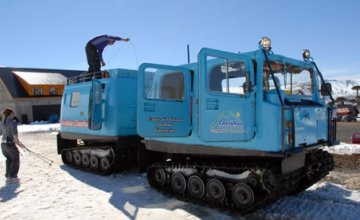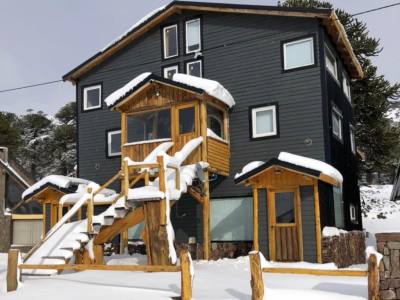
The scent of the sheepherding environment, the traditional clothing of the members of the community and the great number of attendees of this festival are the essence of this gathering of traditions.
In
Caviahue,
Cajón Chico is a synonym for the “summer cattle transhumance area” for the Mapuche people, a place where they spend their everyday lives during hot weather and the site chosen for the annual Loom Festival late in the summer. It is a wide valley nestled by mountains with small lagoons and huge rocks spread at random. Several rural houses with their cows, horses and goats were the ideal environment for the exhibition of the rural skills planned for this celebration. Everything started very early on a Saturday morning. The area boasted its festival colors thanks to the hard-working planners. National colored flags and posts recently painted led us to the wild horse riding arena, the spot where the most attractive events take place. At the broadcasting stand, the presenter and
payadores (
gaucho minstrels) conducted the festival by cheering up and entertaining attendees but, mainly, by giving details about the schedule of events.

The opening parade was amazing: enveloped by a big dust cloud, the Mapuche horsemen started to come into the riding arena bearing their insignia. They showed off their best clothes and their horses were dressed up with plaited leather and silver details. “Sorry for the dust, but it is the arrival of Argentinian peasants! Don’t stop clapping your hands!”, were the words uttered by the presenter. “Dogs, faithful to their
gauchos, could not stay at home and they have also come to this celebration”, he added. Clothing varied according to the different generations of horsemen. While the old ones had not forgotten to wear their traditional woolen hats and a
facón (dagger) at their backs tucked into their belts, the young ones were proud to wear more informal clothing: woolen or knitted beret tipped to the side and cell phones in the side pockets of their loose-fitting
bombacha pants.
Off Script
All of a sudden, a herd of curious goats crossed the parade among various delegations. As this herd was supposed to take its daily natural route, nobody dared to stop them.

The first challenge was the selection of the best “tack”. We could see a series of
criollo horse riding skills for all ages. They displayed all the tasks of their daily rural life: wild horse riding, calf hobbling competition, roping and riding the animal bareback, the ring race, etc. The movements of the horse and its rider were so harmonious that they started to blend as one. We visited the stands where different kinds of blankets,
ponchos and woven wide belts on looms attracted the attention of guests. We appreciated the hard work and the variety of techniques used by weavers. Lorena Torres, the young woman who ran the organization, revealed she was absolutely certain that women and young people have played an important role within the community. Along with the loom teacher, Herminia González, these women have been involved in passing on their traditions regarding not only this female activity but also the oral language learned from the elderly. Herminia explained to us the steps previous to loom weaving: from the preparation of warp with the wool from their own sheep to the setting up of the wooden frame and the support of the fabric, all of which is made by these women. “What product do you think dyes the clothes?”, asked Lorena. “The soot from the stoves, onion skins and pine kernels, among other ways of dyeing”, she told us bearing in mind our poor knowledge on this artistic activity.

Herminia’s hands passed the yarns through the looms, by grabbing the woven piece with a wooden stick in order to tighten it. We learned how to draw the design, to handspin yarn on a spinning wheel and that the craftswomen of the community Millaín Currical had been granted awards as the best weavers in the Province of Neuquén. We felt kindness and respect about their traditional greeting of kissing both cheeks. We bade farewell to them and we took this expression of love and respect as our own. We promised to come back to this festival which, year after year, offers more and more activities, appeals more attendees and adds brightness to the town. We left two days of incredible wild horse riding behind in order to choose the best riding but, above all, to satisfy our desire to chat over the bonfire.






























